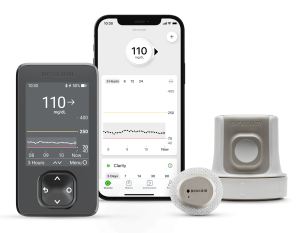
Type 1 and type 2 diabetes are both chronic conditions that affect how the body regulates blood sugar (glucose). Glucose is the main source of energy for the cells in the body, but it needs insulin to enter the cells. Insulin is a hormone produced by the pancreas. In type 1 diabetes, the immune system destroys the cells in the pancreas that make insulin, so the body cannot produce any insulin at all. In type 2 diabetes, the body either does not make enough insulin or does not use it effectively. This causes glucose to build up in the blood, which can lead to serious health problems.
MedCare offers Dexcom and Abbott Libre CGM’s for diabetic resupply to help improve the long-term well-being of our patients. Dexcom and Abbott Libre are two of the leading brands of CGM devices that offer different features and benefits to suit different needs and preferences. MedCare provides regular resupply reminders and fast delivery for peace of mind, so you never run out of sensors, transmitters, or receivers. With MedCare and CGM, you can take control of your diabetes and live a healthier and happier life. Speak with your Doctor to determine if a CGM is right for you.

Continuous glucose monitoring (CGM) is a technology that measures glucose levels throughout the day and night. It uses a tiny sensor inserted under the skin that sends data to a device worn on the body or a smartphone app. CGM can help people with diabetes monitor their glucose trends, see how their food, exercise, and medication affect their glucose levels, and alert them to high or low glucose levels. CGM has many benefits compared to historical testing methods, such as fingerstick blood glucose meters or urine test strips. Some of these benefits are:
CGM can improve diabetes management and quality of life by helping people with diabetes adjust their insulin doses, food intake, and physical activity based on their glucose patterns.
CGM provides more information than a single blood glucose reading. It shows the direction and speed of glucose changes, which can help prevent or treat hypoglycemia (low blood sugar) or hyperglycemia (high blood sugar).
CGM reduces the need for fingerstick testing, which can be painful, inconvenient, and inaccurate.
CGM can also improve long-term health outcomes by lowering hemoglobin A1c (HbA1c), which is a measure of average blood glucose over three months.